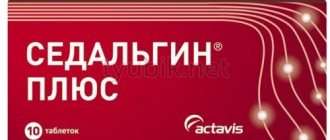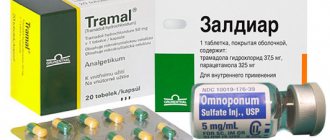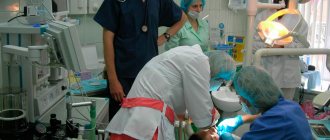pharmachologic effect
The tablets have a combined composition and have antipyretic, analgesic, antimigraine and vasodilating effects. The medication is able to eliminate the symptoms of influenza , acute respiratory infections, and colds.
Caffeine stimulates brain activity, in particular psychomotor centers. The active substance increases performance (mental and physical), reduces the severity of feelings of fatigue and drowsiness , has an analeptic effect, and enhances the effect of analgesics.
Codeine has an analgesic effect by changing the emotional perception of pain, which is achieved by stimulating the antinociceptive system. Suppression of the excitability of the cough center provides an antitussive effect of central origin. Compared to Morphine, the active component is less likely to cause respiratory depression, nausea, miosis, and constipation (when opioid receptors are activated in the intestinal lumen, smooth muscle tissue relaxes, sphincter spasm decreases, and peristalsis decreases). Codeine can enhance the effect of analgesics.
Paracetamol is a non-narcotic analgesic. The mechanism of action is based on blocking cyclooxygenases-1,2 in the nervous system. The antipyretic and analgesic effect is achieved by influencing the centers of thermoregulation and pain.
Metamizole Na belongs to the group of NSAIDs. It has antipyretic and analgesic effects. An antispasmodic effect is observed on the smooth muscles of the biliary and urinary tract.
Phenobarbital has sedative, antiepileptic, muscle relaxant and hypnotic effects.
Sedalgin-Neo tablets No. 10x1
Name
Sedalgin-Neo tablets in sheets in pack No. 10x1
Description
Round flat tablets with a bevel, a score on one side, with a diameter of 13 mm, from white to almost white.
Main active ingredient
Codeine+caffeine+metamizole sodium+phenobarbital+paracetamol
Release form
Pills
special instructions
This medicine is suitable for people with celiac disease (celiac disease). Patients with a wheat allergy (other than celiac disease) should not take this drug. Contained as an excipient, sodium metabisulfite can cause allergic-type reactions, including anaphylactic symptoms in sensitive patients and bronchospasm.
pharmachologic effect
Sedalgin-neo is a combined drug with a clear analgesic and antipyretic effect. In combination, the analgesic effect of the individual components is enhanced, and side effects and the possibility of developing addiction are reduced as a result of the use of smaller doses of the components included in the drug. The combination also exhibits the following effects: some relaxing effect on the smooth muscles of the biliary and urinary tract and uterus; sedative (calming) effect on the central nervous system; a beneficial effect on the blood vessels of the brain and a decrease in intracranial pressure (headache decreases). Caffeine reduces the sedative effects of the other components, and the combination as a whole does not significantly impair performance. Codeine has a clear antitussive effect and enhances the analgesic effect of metamizole and paracetamol.
Indications for use
Sedalgin-neo is used for short-term and symptomatic treatment of pain of various origins that is difficult to treat when individual components are used independently:
- headache, migraine, toothache;
- pain after injuries, operations and burns;
- neuralgia and neuritis, acute pain in joints and muscles;
- pain syndrome in cancer patients.
Directions for use and doses
Always use Sedalgin-neo according to the instructions in this leaflet. If you are unsure about anything, ask your doctor or pharmacist. The drug is taken orally. Usually take one tablet 3-4 times a day. The maximum single dose is 2 tablets, and the maximum daily dose is 6 tablets. The course of treatment lasts no more than 3 days. The tablets are taken during meals with liquid. Children and teenagers The drug is not suitable for children and teenagers! If you miss a dose Do not take double the dose to make up for the missed dose. Do this at your next regular appointment. If you have any additional questions about the use of this medicine, please contact your doctor or pharmacist.
Use during pregnancy and lactation
The active ingredients may cause harm to the fetus when used during pregnancy. They pass into breast milk. For these reasons, Sedalgin-neo is not used during pregnancy and lactation. If a breastfeeding woman is a CYP2D6 “ultra-rapid” metabolizer, higher concentrations of the active metabolite morphine may be present in breast milk and, in very rare cases, this may result in symptoms of opioid toxicity in the infant, which can be fatal.
Impact on the ability to drive vehicles and operate equipment
Most of the components of Sedalgin-neo affect the central nervous system, change sensory and motor reactions, therefore, during treatment with this drug, it is recommended to temporarily refrain from driving a car and working with equipment, or do this with increased attention.
Precautionary measures
Talk to your doctor or pharmacist before taking Sedalgin-neo if: You are allergic to metamizole. Patients who have ever had an allergic reaction to metamizole should not take it again. You are taking other medications that contain metamizole because of the risk of overdose and serious liver damage. You have a peptic ulcer in the active stage. You have kidney or liver damage. You are over 65 years old, due to an increased risk of intoxication. You often use painkillers. Frequent use of pain medications can cause permanent kidney damage and increase the risk of developing kidney failure. “Aspirin” asthma, bronchial asthma in combination with rhinosinusitis and nasal polyps, chronic urticaria, alcohol intolerance. If you have frequent headaches and regular use of painkillers does not help, contact your doctor. To prevent the possible development of chronic headaches, recommended daily doses of pain medications should be closely monitored and significant monthly use of migraine medications should be avoided. The use of the drug should be stopped immediately if there are symptoms of anaphylaxis (sudden severe allergic reaction with skin rash, suffocation, complaints from the gastrointestinal tract and cardiovascular system) and agranulocytosis (sharp decrease in granulocytes - a type of white blood cells, fever, development of infections ). With frequent and long-term use of Sedalgin-neo, monitoring of the blood picture and indicators of kidney and liver function is necessary. Metamizole contained in Sedalgin-neo can turn urine red, which has no clinical significance. Metamizole in the drug may cause hypotensive reactions. In patients with severe coronary artery disease or cerebral artery stenosis, the use of the drug is possible with careful hemodynamic monitoring. With prolonged use of Sedalgin-neo, it is possible to develop dependence and addiction to the codeine it contains. Some people who are metabolizers (called "extra-rapid" metabolizers) may experience symptoms of codeine overdose, such as confusion, drowsiness, shallow breathing, constricted pupils, nausea, vomiting, diarrhea, and loss of appetite, even at recommended doses. In more severe cases, there may be symptoms of poor circulation and respiratory depression, which can be life-threatening and very rarely fatal.
Interaction with other drugs
Please tell your doctor or pharmacist if you are taking or have recently taken any other medicines, even those without a prescription. The components of the combination interfere with the metabolism (absorption) of many drugs, so combined use with other medications should be avoided. Tell your doctor if you are taking any of the following medications: coumarin anticoagulants; cyclosporine (for immune suppression); tricyclic antidepressants; oral contraceptives; allopurinol (against gout); chloramphenicol and other drugs that damage the bone marrow due to increased myelotoxicity (suppression of bone marrow function); aminophenazone (against pain and fever); anti-tuberculosis antibiotic rifampicin; cimetidine (for stomach protection); alcohol and other drugs that damage the liver; barbiturates, benzodiazepines, sleeping pills and sedatives; MAO inhibitors; anticholinergics; non-steroidal anti-inflammatory drugs (such as ketoprofen, ibuprofen, naproxen, diclofenac); griseofulvin (anti-fungus); quinidine (antiarrhythmic drug); doxycycline (antibiotic); estrogens (female sex hormones); phenytoin, carbamazepine (anticonvulsants); phenothiazine (a medicine that affects the psyche); very strong painkillers (narcotic analgesics); sodium valproate and valproic acid. Special instructions for certain groups of patients Use in people with impaired liver or kidney function Before taking any medicine, consult your doctor or pharmacist. In patients with impaired liver and kidney function, Sedalgin-neo should be used with caution. The drug is contraindicated in severe renal and liver failure.
Contraindications
Do not use Sedalgin-neo: if you are allergic (hypersensitivity) to any active or excipient in the drug; if you have any blood diseases (hemorrhagic diathesis, aplastic anemia, leukopenia or agranulocytosis); if you have bronchial AS type); if you have bronchospasm, urticaria and other allergic reactions to salicylates, other narcotic analgesics and NSAIDs, a history of exfoliative dermatitis; in the presence of some rare diseases associated with metabolism (hereditary deficiency of glucose-6-phosphate dehydrogenase, liver porphyria); with severe renal and liver failure; with abuse of narcotic analgesics, sleeping pills and sedatives; during pregnancy; during breastfeeding; if your doctor has told you that you are a CYP2D6 “extra-rapid metabolizer”; in childhood.
Compound
Active ingredients in one tablet: paracetamol 300 mg, metamizole sodium monohydrate 150 mg, caffeine 50 mg, phenobarbital 15 mg, codeine phosphate hemihydrate 10 mg. Excipients: microcrystalline cellulose, wheat starch, povidone, crospovidone, sodium metabisulfite, talc, magnesium stearate.
Overdose
If you take a higher dose than prescribed, consult your doctor immediately! In case of overdose, some of the following symptoms may occur: depression of the central nervous system, expressed by dizziness, drowsiness, slow reactions, suppressed breathing, severe weakness to the point of loss of consciousness, slow pulse, low blood pressure, serious damage to liver function.
Side effect
Like any medicine, Sedalgin-neo can cause side effects, although not everyone gets them. Most often, side effects are temporary and go away when treatment is stopped. The following reactions are possible in some patients: immune system disorders increased risk of anaphylaxis (severe, life-threatening allergic reaction) and agranulocytosis (decreased number of white blood cells with a tendency to infection), which can occur at any stage of treatment and is not dependent on the daily dose; allergic reactions: itching, skin rashes, provoking an asthma attack, dyspnea (suffocation). from the gastrointestinal tract - dry mouth, abdominal pain, nausea, vomiting, constipation or diarrhea, increased liver transaminases. from the nervous system - drowsiness, fatigue, loss of coordination, tremor, anxiety, irritability; with longer use - the development of dependence. from the cardiovascular system - decreased blood pressure, palpitations, extrasystole (uneven pulse). from the kidneys and urinary tract - with prolonged use in high doses, kidney damage is possible (interstitial nephritis, development of renal failure). from the hematopoietic and lymphatic systems - in very rare cases, hemolytic anemia (a decrease in the number of red blood cells, which can lead to pale or yellowing of the skin, weakness, shortness of breath), thrombocytopenia (a decrease in the number of platelets, which increases the risk of bleeding and bruising Phenobarbital may cause exfoliative dermatitis (toxic epidermal necrolysis, Stevens-Johnson syndrome).If any of the side effects become serious, or you experience other side effects not listed in this leaflet, tell your doctor. or your pharmacist. This includes all possible adverse reactions not listed in this leaflet.
Storage conditions
At a temperature not higher than 25°C. Keep out of the reach of children! Shelf life: 3 (three) years. The drug should not be used after the expiration date indicated on the package!
Side effects
allergic responses , thrombocytopenia (decreased number of blood cells - platelets ), dizziness are rarely observed . With long-term therapy, pathology of the kidneys and renal system may develop, and bronchial asthma attacks may become more frequent. When the medication is abruptly discontinued, withdrawal symptoms are recorded, manifested mainly by headaches . Long-term use may be accompanied by a gradual decrease in the effectiveness of the drug.
Nervous system:
- irritability;
- limb tremors;
- headache;
- fast fatiguability;
- anxiety;
- impaired coordination of movements.
The cardiovascular system:
- agranulocytosis;
- extrasystole;
- arterial hypotension;
- cardiopalmus;
- hemolytic anemia.
Digestive tract:
- constipation;
- epigastric pain;
- vomit;
- anorexia;
- dry mouth;
- diarrhea syndrome;
- changes in liver function.
Bronchospasm is rarely observed. If other negative reactions are registered, consultation with a doctor and independent discontinuation of the drug Sedalgin is required.
Sedalgin-Neo® (Sedalgin-Neo®)
Before prescribing the drug Sedalgin-Neo®, the benefit-risk ratio of its use should be carefully assessed; if the potential risk of use exceeds the expected benefit, then alternative treatment should be discussed.
Taking Sedalgin-Neo® should be stopped immediately if signs of anaphylaxis (severe allergic reactions that occur suddenly and are accompanied by skin rash, shortness of breath, gastrointestinal and cardiovascular complaints) and agranulocytosis (severe neutropenia, fever, sepsis and others) appear. signs of an infectious disease).
The drug Sedalgin-Neo® should not be taken by patients who have had hypersensitivity reactions after taking medications containing metamizole sodium.
Due to the risk of overdose, caution should be exercised when taking medications containing paracetamol at the same time.
Exceeding recommended doses may cause very serious problems with liver function. In this case, it is necessary to start treatment with an antidote as soon as possible (see section Overdose).
With long-term and frequent use of the drug, it is necessary to monitor blood parameters and indicators of renal and hepatic function.
The drug should be avoided in patients with gastric and duodenal ulcers in the acute phase, as well as in patients with severe renal and liver failure.
During treatment, you should avoid drinking alcohol due to poor tolerability of simultaneous use with the drug.
Metamizole sodium contained in the drug Sedalgin-Neo® may turn urine red, which has no clinical significance.
The drug Sedalgin-Neo® should be taken with caution in elderly patients due to the fact that signs of intoxication occur more often in this group of patients.
After long-term use (more than 3 months) of analgesics when taken every other day or more often, a headache may occur or an existing one may worsen. Headache caused by excessive use of analgesics should not be relieved by increasing the dose. In these cases, taking analgesics should be discontinued after consultation with your doctor.
Long-term use of the drug Sedalgin-Neo® can lead to the development of codeine addiction.
Risk of concomitant use of sedative medications
Concomitant use of codeine and sedative drugs, such as benzodiazepines or related drugs, may lead to sedation, respiratory depression, coma, and death. Because of these risks, coadministration of these sedatives should be limited to patients for whom alternative treatment options are not available. If a decision is made to prescribe this codeine-containing drug concomitantly with sedatives, the lowest effective dose should be used and the duration of treatment should be as short as possible.
Patients should be closely monitored for symptoms and signs of respiratory depression and sedation. In this regard, it is strongly recommended to inform patients and their caregivers about such symptoms (see section Interactions with other medicinal products).
Participation of the CYP2D6 isoenzyme in metabolism
Codeine is metabolized by the CYP2D6 isoenzyme to the active metabolite, morphine. If the patient has insufficient activity of this isoenzyme or this enzyme is absent in the body, then in this case it is impossible to achieve a sufficient analgesic effect during treatment.
Presumably 7% of the Caucasian population may have insufficient activity of this isoenzyme. If a patient has a high rate of codeine metabolism, there is an increased risk of developing adverse effects of opioid toxicity, even when taking the drug in recommended doses. In this group of patients, codeine is rapidly metabolized to morphine, and morphine in the blood plasma reaches higher concentrations than in the rest of the population.
Common symptoms of opioid toxicity include: confusion, drowsiness, shallow breathing, constricted pupils, nausea, vomiting, constipation and lack of appetite. In severe cases, circulatory and respiratory collapse may develop, which can be life-threatening and, in very rare cases, fatal.
The expected frequency of high isoenzyme activity in different populations is shown below:
| Population | Frequency, % |
| Africans/Ethiopians | 29% |
| African Americans | 3,4-6,5% |
| Mongoloid race | 1,2-2% |
| Caucasian | 3,6 — 6,5% |
| Greeks | 6,0% |
| Hungarians | 1,9% |
| Northern Europeans | 1-2% |
Use in children after surgery
There have been reports in the literature that taking codeine after tonsillectomy and/or adenoidectomy due to sleep apnea syndrome has in rare cases resulted in life-threatening adverse events, including death. All children received codeine in recommended doses, however, there is an assumption that this group of patients had high metabolic activity, which contributed to the active conversion of codeine to morphine.
Use in children with respiratory impairment
Codeine and codeine-containing products are not recommended for use in children with respiratory problems, including neuromuscular disorders, severe heart or respiratory disease, upper respiratory or lung infections, multiple traumas, or major surgery. These conditions may worsen symptoms of morphine toxicity.
Due to the presence of wheat starch, the drug should not be taken by patients with celiac enteropathy (a hereditary disease of the small intestine characterized by diarrhea when eating foods containing gluten).
Sodium disulfite contained as an excipient can cause allergic reactions, including anaphylactic shock in patients sensitive to this component.
The drug Sedalgin-Neo® can change the results of doping control tests for athletes. It makes it difficult to establish a diagnosis in acute abdominal pain syndrome.
Patients suffering from atopic bronchial asthma and hay fever have an increased risk of developing hypersensitivity reactions.
Interaction
Anxiolytics, sedatives and all medications that depress the functioning of the nervous system can lead to increased sedative effect of Sedalgin Neo and depression of the respiratory center (a life-threatening condition). The drug enhances the effect of alcohol-containing drinks on psychomotor reactions. Metamizole displaces hypoglycemic drugs, indirect anticoagulants, indomethacin, and glucocorticosteroids from binding to proteins, increasing their activity. Oral contraceptives , antidepressants and Allopurinol increase the toxicity of Metamizole Na by changing its metabolism in the hepatic system. The effect of the active component is reduced when taking inducers of microsomal liver enzymes. An increase in toxic effect is observed during treatment with other non-narcotic analgesics.
Analogs
Level 4 ATC code matches:
Phenacetin
Combiflu
Chlorphenamine
Coldflu
Calpol
Fervex
Panadol Extra
Panadol for children
Panadol
Solpadeine
Efferalgan
Milistan
Coldrex Maxgripp
Coldrex Hotrem
Coldrex
AntiGrippin
Unispaz
Pentalgin Plus
Rapidol
Maxicold
- Sedal-M;
- Quintalgin;
- Santoperalgin.



